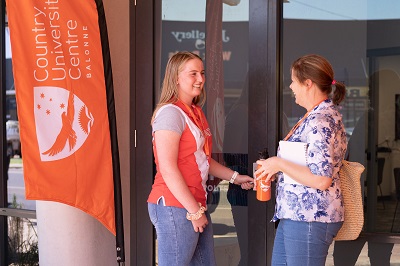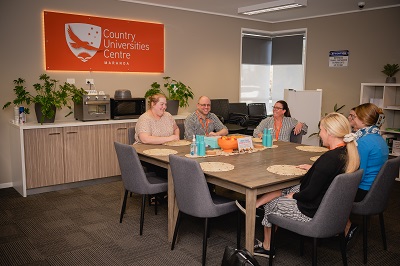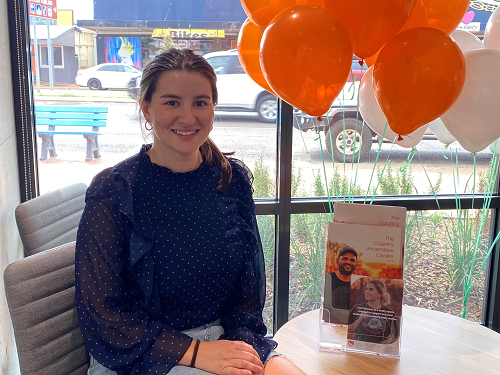CUC providing opportunities for tertiary education in remote and rural communities
| Next Article |
Feature article by Duncan Taylor, CEO Country Universities Cente
 In August, as part of its Five Year Productivity Inquiry, the Productivity Commission posed the question of how easily your Shire’s workforce can skill and reskill, and what vocational and higher education systems you might locally have developed to meet the challenge of the evolving nature of your local modernising economy?
In August, as part of its Five Year Productivity Inquiry, the Productivity Commission posed the question of how easily your Shire’s workforce can skill and reskill, and what vocational and higher education systems you might locally have developed to meet the challenge of the evolving nature of your local modernising economy?
What systems do you locally have in place? Can you grow your own workforce with an opportunity to shift and uplift their knowledge and qualifications to remain productive, relative and valuable to your local community?
Several Councils in Queensland are starting to respond to these challenges by encouraging the establishment of a connected and visible Country Universities Centre through the Commonwealth Regional University Centre Program.
The Country Universities Centre was founded in Cooma (population 8,000) in 2013, and has since expanded to a network of 20 Centres in Queensland, New South Wales and Victoria. Each Centre has fast connectivity, technology and staff to assist students to successfully study higher educational and vocational courses. The Centres have long opening hours (at least 7am to midnight) to accommodate different demands as the students seek knowledge, qualifications and networks with the Centre’s support.
Every Centre is locally governed by its own not for profit community Board and driven to fit the local needs of each unique community, but is affiliated with a network of like Centres to overcome the tyrannies of small scale, distance and small regional populations.
Founder of the Country Universities Centre, Duncan Taylor, says that the network approach to supporting higher education students makes the model more sustainable in regional populations.
“Our Centres are there for use by all higher education students in the community, no matter what course they study, no matter what university they enrol in. That assists sustainability compared to having just one university provide a few course options in a town. Then, all our Centres work together in a network such that the whole is greater than the sum of the parts. In that way, we can collectively offer opportunities for universities, government and industry beyond what is achievable by just one facility in one town.”
 In its Five Year Productivity Inquiry, the Productivity Commission pushed back against policies and models that constrain students from studying what they wish to choose, stating that students are the best informed of their abilities and interests, so are best placed to determine what they wish to study. The Commission cited international evidence that limiting student choice may be harmful for careers (Page 56)
In its Five Year Productivity Inquiry, the Productivity Commission pushed back against policies and models that constrain students from studying what they wish to choose, stating that students are the best informed of their abilities and interests, so are best placed to determine what they wish to study. The Commission cited international evidence that limiting student choice may be harmful for careers (Page 56)
For this reason, the Country Universities Centre believes that its model of encouraging diversity of student choice in courses of study in regional communities is best aligned with the Productivity Commission’s recent report. Within its Centres, last semester students studied 861 different tertiary courses leading to an enrichment of knowledge and diversity of qualifications in its communities.
The Country Universities Centre has worked with communities to establish facilities in populations as large as 22,000 down to a population as small as 600 at Dirranbandi, which operates together with St George as part of a Balonne Shire model.
The Balonne model is a pilot for low population remote communities and is exceeding expectations. It was projected to reach 38 student registrations upon Centre maturity, but has had over double that number register with the Centre last semester after just one year of operation.
Balonne Shire Council was awarded the 2022 Butch Lenton Memorial Bush Council Innovation Award at the recent LGAQ Annual Conference for the pilot, and will receive a $10,000 bursary from Peak Services to design and develop a community relevant literacy and numeracy program to support the vocational and higher education pathways now available through the Centre. CUC Balonne Centre Manager Alix Greenhill explains there is a community need for improving literacy and numeracy skills within the shire.
“The bursary will be responding to a community need that I am hearing from a number of sources including the Council, local businesses and residents. I feel there’s a great core need for improving foundational skills in this community. CUC Balonne will, through this course, create a learning ecosystem so that no matter where you are in your journey, we’ll be able to provide you with the support to get to where you want to go,” Mr Greenhill said.
 Balonne CUC student, Lucy Sevil
Balonne CUC student, Lucy Sevil
Balonne CUC student, Lucy Sevil, has grown up 50 kilometres south of Balonne in St George and can’t imagine being anywhere else. She is studying a Bachelor of Sustainability with the University of New England through the CUC Balonne Centre and says “CUC Balonne serves as a great place to go and study, remain motivated and have the same resources and capabilities as students on campus.” She has already secured work locally in her chosen field with the Murray Darling Basin Authority and the Department of Climate Change, Energy, Environment and Water.lie Mullins studies a Bachelor of Nursing at the University of Southern Queensland through CUC Balonne and said he “found the CUC at the right time after attending one of its opening days in St George, registering at the Centre gave me the confidence I needed to begin my degree.”
Nearby, the CUC Maranoa Centre at Roma opened to students in March 2021 and has also exceeded all expectations with 192 students registered this semester. Two-thirds of those students are permanent residents of the region, with the remaining third being placement and visiting students to the area.
CUC Maranoa Centre Manager Rebecca Coffey is overjoyed at the student numbers in Maranoa.
“Most often, our placement students have not been west of the Great Divide, so coming out to Roma for a rural placement can be quite daunting. We take great pleasure in helping them to feel as welcome and excited about being in Roma as possible. Through hosting a wide range of social engagement activities and events, our visiting students quickly get to know and network with other regional students. Despite coming from major metropolitan university campuses, it is a delight when we tour them through the Centre and they say that our facility is second to none! Our hope is that by the time their placement is over, Roma is a solid option for their future career options," Ms Coffey said.
The Country Universities Centre is currently working with Cooktown and Mt Isa to potentially have Centres open during 2023, further extending the CUC network in Queensland. Cook Shire Mayor, Peter Scott stated at the LGAQ conference in Cairns last week, “If we keep people on country, close to home, that’s where they’re going to get the best benefit and we’re going to get the best benefit.”
Lawrence Booth, CUC Cape York Board Member and Cook Shire Director of Community Economy and Innovation agrees the benefit flows both ways with opportunities for students equals benefits for community.
“The centre will provide the opportunity to grow our own workforce and build local industry by supporting students with opportunities to study in areas that link to local jobs.”
Further Queensland Councils are working with the Country Universities Centre to progress planning of facilities to be established as additional funding opportunities become available. This includes regions from the western remote communities through to those closer to the higher population coast that will undergo economic and workforce transition as a result of changing government priorities and policies.
Duncan Taylor says that the CUC is working hard with these regional Queensland communities so that their local workforces can have the knowledge and skills to be relevant and productive into the future, as the local economies evolve to meet modern challenges. Communities can themselves take some control of their destiny by growing their own talent with this local model, and residents can be supported to skill and reskill so that regional communities can overcome the gaps and distances that have historically challenged their development.
The LGAQ, proudly supported by Peak Services, is holding a study tour in November to visit CUC centres at St George, Roma and Dirranbandi. To register your interest, complete this form LGAQ RUC Study Tour
Productivity Commission Interim 5 Year Inquiry can be found here: https://www.pc.gov.au/inquiries/current/productivity/interim5-learning/productivity-interim5-learning.pdf